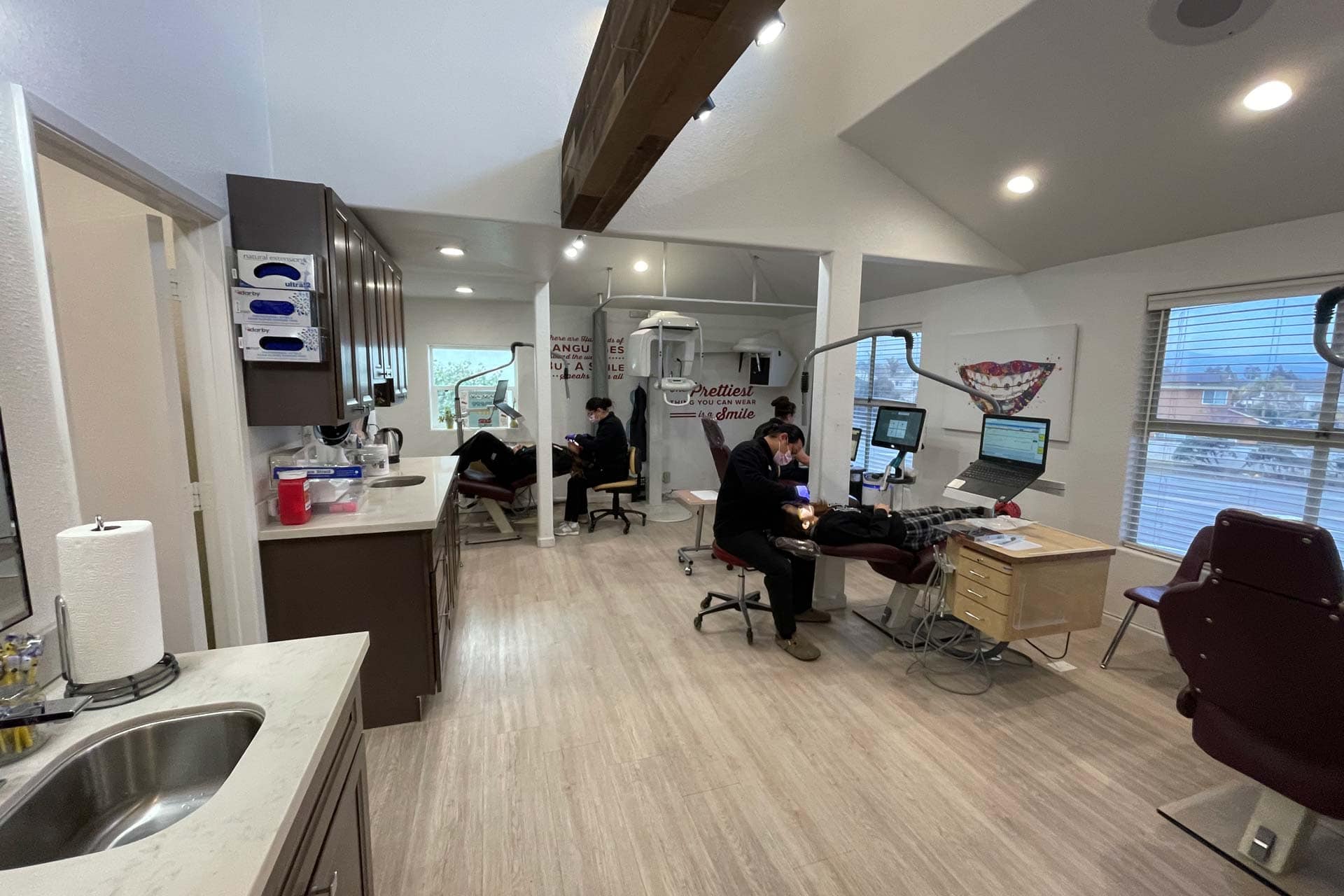Common Problems
At Monterey Bay Orthodontics, we specialize in correcting a wide range of orthodontic issues to improve our patients’ oral health, functionality, and confidence. Understanding the common conditions we treat can help you recognize potential issues in yourself or your family members. Here’s an overview of the most frequent orthodontic problems and how they can impact your dental health:
- Underbite — An underbite occurs when the lower teeth extend beyond the upper front teeth. This misalignment can cause difficulty in chewing and speaking and may lead to increased wear on the teeth. It can also contribute to jaw joint discomfort and challenges in maintaining effective oral hygiene.
- Crossbite — A crossbite is present when some of the upper teeth sit inside the lower teeth when the mouth is closed. This condition can cause uneven wear of the teeth, gum disease, and can lead to asymmetrical growth of the jaw if left untreated.
- Upper Front Teeth Protrusion — Characterized by the upper teeth extending too far forward or the lower teeth not extending far enough forward, this issue affects both the appearance and function of the teeth. It can increase the risk of trauma to the protruding front teeth and may affect one’s ability to bite properly.
- Overbite — An overbite involves the upper front teeth extending out over the lower front teeth. In severe cases, this can lead to the lower teeth biting into the roof of the mouth. An overbite can cause a variety of issues, including jaw pain and wear on the lower teeth.
- Crowding — Crowding occurs when there is insufficient space for all the teeth to fit normally within the jaws. This can make it difficult to maintain proper oral hygiene, leading to an increased risk of gum disease and tooth decay.
- Spacing — Spacing issues arise when there are gaps between the teeth due to missing teeth or teeth that do not “fill up” the mouth. Besides affecting one’s smile aesthetically, spacing can also impact how well teeth function together.
- Openbite — An openbite is identified when the upper and lower front teeth do not overlap, creating a gap even when the mouth is closed. This condition can impair biting and chewing functions and may contribute to speech impediments.
- Dental Midlines Not Matched — This issue occurs when the back bite does not fit and match appropriately, which can compromise the jaw and proper dental function. The misalignment of dental midlines can signal improper bite and jaw alignment, leading to further complications if untreated.
At Monterey Bay Orthodontics, we utilize the latest technology and personalized treatment plans to address these common orthodontic issues. Our goal is to provide comprehensive care that not only corrects aesthetic concerns but also enhances oral health and functionality. Whether you or a family member are experiencing any of these conditions, our experienced team is here to guide you through every step of your orthodontic treatment, ensuring you achieve a healthy, beautiful smile that lasts a lifetime.

Dental Hygiene
At Monterey Bay Orthodontics, we emphasize the importance of excellent dental hygiene throughout your orthodontic treatment. Achieving a beautiful smile is a collaborative process that extends beyond straightening your teeth—it involves maintaining the health and integrity of your teeth and gums. Here’s how you can ensure optimal dental hygiene through diet, daily maintenance, and professional care:
Diet & Nutrition for Healthy Teeth
What you eat significantly affects your oral health, especially when you have orthodontic appliances. It’s important to limit sugary and acidic foods that can lead to tooth decay and enamel erosion. Opting for healthier alternatives like fruits, vegetables, and nuts in place of sticky or hard candies can protect your braces and your teeth. Hard foods should be consumed with caution; cutting them into smaller pieces can prevent damage to your braces. Staying hydrated by drinking water frequently helps rinse away food particles and bacteria, promoting a healthy oral environment.
Daily Oral Hygiene Practices
Maintaining a rigorous oral hygiene routine is critical when wearing braces or other orthodontic appliances. Brushing your teeth at least twice a day with fluoride toothpaste ensures that both your teeth and braces are clean. An orthodontic toothbrush or an electric toothbrush can offer a more effective cleaning around braces and wires. Flossing might pose a challenge, but it remains an essential aspect of your daily routine. Using floss threaders or water flossers designed for orthodontic appliances can help clean those hard-to-reach areas between your teeth and underwires. Incorporating a fluoride mouthwash into your daily routine can aid in reducing plaque and preventing demineralization, ensuring comprehensive care for your teeth and gums.
The Role of Professional Dental Care
Your relationship with your general dentist remains paramount during your orthodontic treatment. Continuing with regular dental checkups and cleanings every six months — or more frequently if recommended — is crucial for removing plaque and tartar build-up and for the early detection of potential problems. Adhering to professional advice provided by your dentist and orthodontist, such as fluoride treatments or sealants, is key to protecting your teeth during treatment. Furthermore, ensuring open communication between your dentist and orthodontist allows for a cohesive and integrated approach to your oral care.
By combining careful dietary choices, diligent daily maintenance, and regular professional dental care, you can nurture not only a straighter smile but a healthier one too. At Monterey Bay Orthodontics, we are dedicated to supporting you through every step of your orthodontic journey, offering personalized advice and care to make your experience as effective and positive as possible.

Foods To Avoid
At Monterey Bay Orthodontics, ensuring the success and comfort of your orthodontic treatment is our top priority. Part of this commitment involves educating our patients on how to care for their braces or orthodontic appliances, particularly when it comes to dietary habits. Certain foods can pose risks to your appliances and potentially hinder the progress of your treatment. Here’s a comprehensive list of types of foods you should avoid to protect your braces and ensure a smooth orthodontic journey:
- Hard Foods — Avoid nuts, hard candies, popcorn kernels, and ice, as these can bend wires and break brackets.
- Sticky Foods — Chewy candy, gum, caramel, and taffy can adhere to braces, pulling at wires and brackets, and are difficult to clean off.
- Crunchy Foods — Chips, pretzels, and hard taco shells can exert pressure on braces, leading to breakage. Opt for softer alternatives or cut them into smaller pieces.
- Tough Meats & Bread — Choose tender cuts of meat and soft bread over tough meats and crusty bread that require more force to bite into and can strain your appliances.
- Raw Vegetables & Hard Fruits — Cut raw, hard varieties like apples and carrots into small, bite-sized pieces, or consider steaming vegetables to soften them.
- Corn On The Cob, Apples, & Other Whole Fruits — Instead of biting directly into these, cut them into manageable pieces to enjoy without risking damage to your braces.
Following these dietary guidelines doesn’t mean missing out on your favorite foods; it simply involves making small adjustments in how you consume them during your treatment period. By being mindful of these recommendations, you can help ensure a smoother treatment process, avoid unnecessary complications, and allow us at Monterey Bay Orthodontics to focus on achieving the beautiful, healthy smile you deserve.


